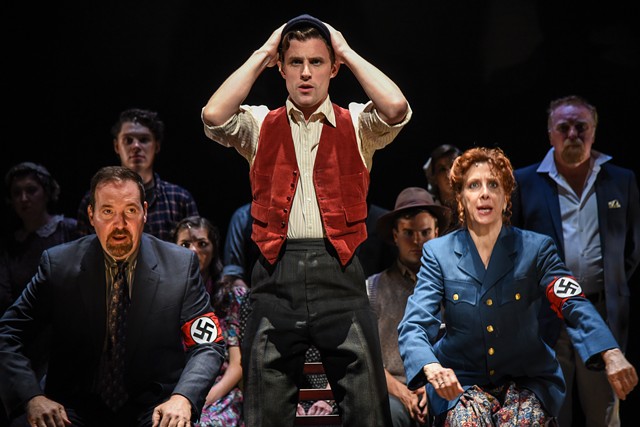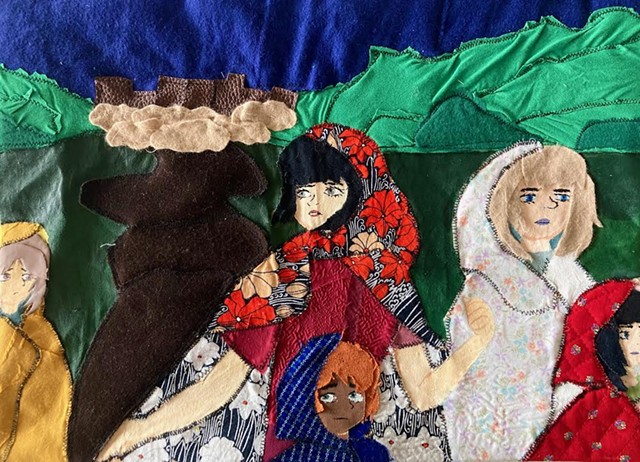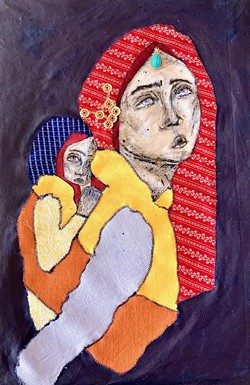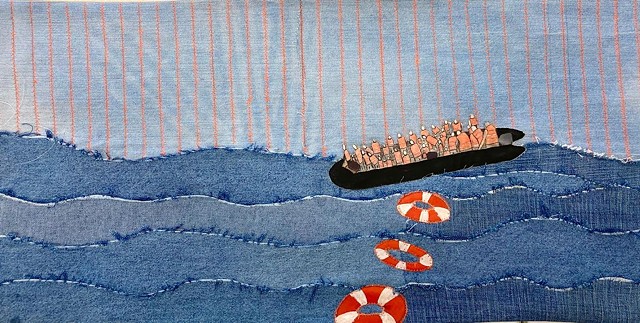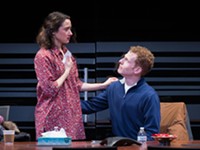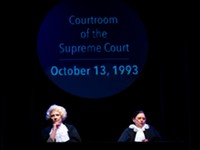Locally grown musical 'Moses Man: Finding Home' bound for Off-Broadway
By Daniel J. Kushner @danieljkushner[
{
"name": "500x250 Ad",
"insertPoint": "5",
"component": "15667920",
"parentWrapperClass": "",
"requiredCountToDisplay": "1"
}
]
The creation of the musical “Moses Man: Finding Home” began with Deborah Haber, executive artistic director of local theater organization DEEP Arts, who wanted to share the story of her parents’ escape from Nazi-occupied Austria to America. Since the project’s inception in 2012, the scope has expanded to include a documentary film component, an art exhibition, and most importantly, stories of contemporary refugees facing similar displacement.
The musical inspired by Lily and Kalman Haber’s nine-year exodus from war-torn Europe had its initial development with a reading at JCC CenterStage and an early run at Geva Theatre. From the beginning, local filmmaker Dave Marshall of Blue Sky Project has documented the musical’s creative process and subsequent evolution.
“It was really only about my parents' story,” Haber said. “And now it has become so much more than that. It becomes the world's story.”
That evolution took a major step when Haber, in search of her parents’ history, discovered the Vienna school where her father had been imprisoned by the Nazis. The school — which now hosts a museum to that time in its basement — now caters mostly to the city’s refugee youth, including those from Afghanistan, Bosnia, Somalia, and Syria.
Haber and her creative team visited the school last fall and asked students to share what it means to be “on the run” through art.
“A lot of it is to give back, because we work with refugee organizations and social service organizations that tie into our mission,” said Haber. “And also, the atmosphere of what's happening with Islamophobia and anti-Semitism — it's very topical right now.”
The upcoming art exhibition “Moses Man: Finding Home — Through Their Eyes" showcases the work of the student refugees and is part of an April 10 event at Temple B’rith Kodesh which also features a talk by JCC Krakow CEO Jonathan Ornstein. (The exhibition will also be shown at readings of the musical this fall in New York City.)
For the upcoming reading, the latest version of the musical “Moses Man: Finding Home” — to which Haber has contributed the lyrics and book alongside music by award-winning Rochester composer Casey Filiaci — also includes modern stories of displacement.
“What I’m trying to do is create a feeling,” said Filiaci, a longtime collaborator with Haber. “That’s what music does that nothing else does. I want to create the atmosphere and the emotion that surrounds the character and the situation that’s happening at the time you’re hearing this music and this song.”
By his count, the composer has written more than 50 songs for the production, though that total has been whittled down to less than 20, including the song “I Won’t Disappear.”
Filiaci's greatest hope is to capture humanity’s paradoxical existence.
“Humans have the capability of great evil, great achievement and great love,” he said. “And that always happens at the same time. We cannot deny any of those things. It's not all or nothing of anything; it's all of those things all at once."
The project, which is funded in part by the Rochester Area Community Foundation and the New York State Council on the Arts, recently received a $15,000 grant from the National Endowment for the Arts.
Haber wants to continue to foster awareness and education about the plight of refugees. Her motto is simple but powerful: “Never again is actually never-ending.”
For more information on the project “Moses Man: Finding Home,” go to deeparts.org.
Daniel J. Kushner is an arts writer at CITY. He can be reached at [email protected].
The musical inspired by Lily and Kalman Haber’s nine-year exodus from war-torn Europe had its initial development with a reading at JCC CenterStage and an early run at Geva Theatre. From the beginning, local filmmaker Dave Marshall of Blue Sky Project has documented the musical’s creative process and subsequent evolution.
“It was really only about my parents' story,” Haber said. “And now it has become so much more than that. It becomes the world's story.”
That evolution took a major step when Haber, in search of her parents’ history, discovered the Vienna school where her father had been imprisoned by the Nazis. The school — which now hosts a museum to that time in its basement — now caters mostly to the city’s refugee youth, including those from Afghanistan, Bosnia, Somalia, and Syria.
Haber and her creative team visited the school last fall and asked students to share what it means to be “on the run” through art.
“A lot of it is to give back, because we work with refugee organizations and social service organizations that tie into our mission,” said Haber. “And also, the atmosphere of what's happening with Islamophobia and anti-Semitism — it's very topical right now.”
The upcoming art exhibition “Moses Man: Finding Home — Through Their Eyes" showcases the work of the student refugees and is part of an April 10 event at Temple B’rith Kodesh which also features a talk by JCC Krakow CEO Jonathan Ornstein. (The exhibition will also be shown at readings of the musical this fall in New York City.)
For the upcoming reading, the latest version of the musical “Moses Man: Finding Home” — to which Haber has contributed the lyrics and book alongside music by award-winning Rochester composer Casey Filiaci — also includes modern stories of displacement.
“What I’m trying to do is create a feeling,” said Filiaci, a longtime collaborator with Haber. “That’s what music does that nothing else does. I want to create the atmosphere and the emotion that surrounds the character and the situation that’s happening at the time you’re hearing this music and this song.”
By his count, the composer has written more than 50 songs for the production, though that total has been whittled down to less than 20, including the song “I Won’t Disappear.”
Filiaci's greatest hope is to capture humanity’s paradoxical existence.
“Humans have the capability of great evil, great achievement and great love,” he said. “And that always happens at the same time. We cannot deny any of those things. It's not all or nothing of anything; it's all of those things all at once."
The project, which is funded in part by the Rochester Area Community Foundation and the New York State Council on the Arts, recently received a $15,000 grant from the National Endowment for the Arts.
Haber wants to continue to foster awareness and education about the plight of refugees. Her motto is simple but powerful: “Never again is actually never-ending.”
For more information on the project “Moses Man: Finding Home,” go to deeparts.org.
Daniel J. Kushner is an arts writer at CITY. He can be reached at [email protected].
Latest in Theater
More by Daniel J. Kushner
-
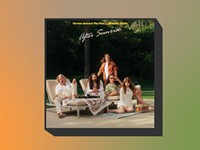
Album Review | 'After Sunrise'
Apr 9, 2024 -
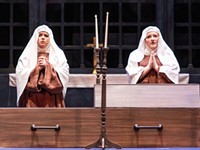
Opera Review | 'Dialogues des Carmélites'
Apr 5, 2024 -
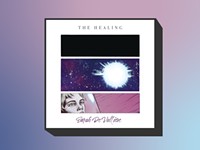
Music Review | 'The Healing'
Apr 4, 2024 - More »
